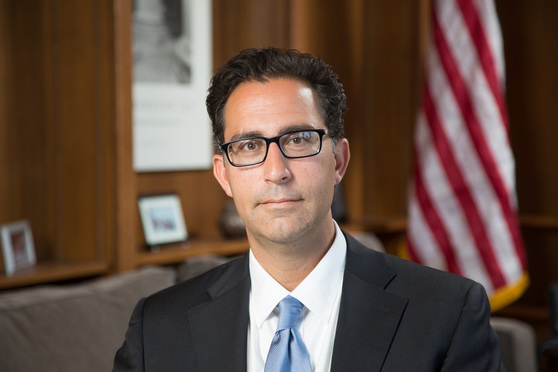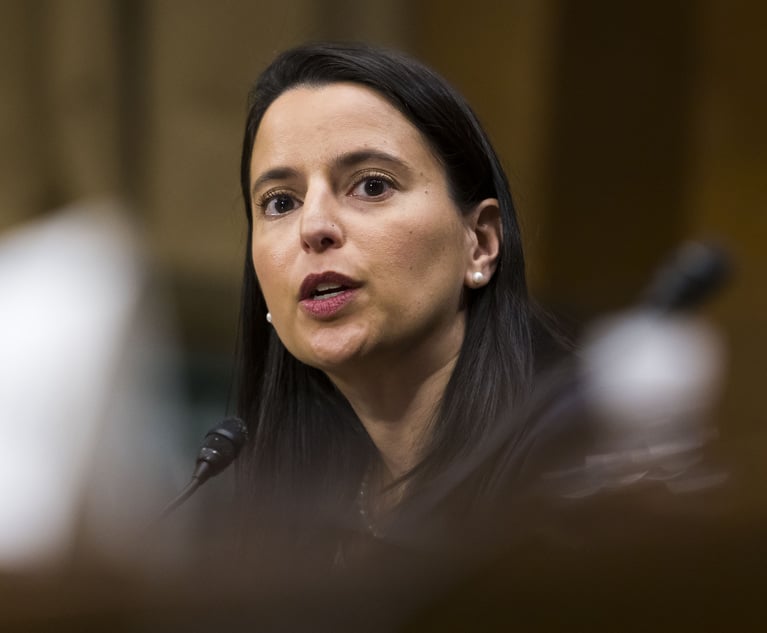In Health Insurance Subsidy Case, SF Judge Poised to Turn Back State's Injunction Bid
SAN FRANCISCO — A federal judge is set to turn back a request from a group of Democratic states attorneys general looking to force the Trump administration…
October 23, 2017 at 06:00 PM
6 minute read

SAN FRANCISCO — A federal judge is set to turn back a request from a group of Democratic states attorneys general looking to force the Trump administration to pay certain insurance subsidies created under the Affordable Care Act.
President Donald Trump announced on Oct. 11 that he would end federal payments for so-called cost-sharing reductions under the ACA, which pay insurers to cover out-of-pocket expenses and co-payments for low-income people.
California, New York, Connecticut, Pennsylvania, 14 other states and the District of Columbia earlier this month sued the administration, claiming the decision could cut off billions of dollars in subsidies and create chaos in ACA exchanges in the run-up to open enrollment, which is set to begin on Nov. 1.
But at a court hearing Monday, U.S. District Judge Vince Chhabria of the Northern District of California, who is overseeing the case, said most states have anticipated the move and made changes to their insurance policies that will actually result in lower premiums for most low-income consumers purchasing insurance on ACA exchanges.
“It seems to me that California and the insurance companies have worked together to anticipate this and have worked on the assumption that this would happen,” said Chhabria of Trump's move to cut off the payments. “To reverse course now seems like it would create further instability.”
Chhabria held off ruling at the end of the hearing, but said that he would issue a written ruling on Tuesday or Wednesday.
Chhabria said most states, anticipating the Trump administration's move, developed a “clever” way to allow insurance companies to increase their rates in such a way that it would actually benefit consumers. Most exchanges rate plans as bronze, silver, gold, or platinum based on the level and quality of coverage. Chhabria said that the 40 or so states that planned ahead allowed insurance companies to increase rates in the silver plans, which set the baseline for the level of tax credits the federal government pays to help lower-income consumers buy insurance. The increase in premiums for silver plans had the effect of making all other plans comparatively less expensive for people receiving tax credits under the ACA, he said.
“Why did you seek a preliminary Injunction to get these apparent benefits undone?” Chabbria asked California's lawyer, Deputy Attorney General Gregory Brown.
Brown replied there would still be 2.1 million consumers whose premiums would go up as a result of the move, and the resulting “uncertainty and chaos” would driver insurers out of the market.
At the end of the hearing, Chhabria said that by denouncing the president's move and running to the courthouse, California might be doing more harm than good.
Said Chhabria, “To the extent there's chaos and confusion I wonder how much of it is California's fault.”

SAN FRANCISCO — A federal judge is set to turn back a request from a group of Democratic states attorneys general looking to force the Trump administration to pay certain insurance subsidies created under the Affordable Care Act.
President Donald Trump announced on Oct. 11 that he would end federal payments for so-called cost-sharing reductions under the ACA, which pay insurers to cover out-of-pocket expenses and co-payments for low-income people.
California,
But at a court hearing Monday, U.S. District Judge
“It seems to me that California and the insurance companies have worked together to anticipate this and have worked on the assumption that this would happen,” said Chhabria of Trump's move to cut off the payments. “To reverse course now seems like it would create further instability.”
Chhabria held off ruling at the end of the hearing, but said that he would issue a written ruling on Tuesday or Wednesday.
Chhabria said most states, anticipating the Trump administration's move, developed a “clever” way to allow insurance companies to increase their rates in such a way that it would actually benefit consumers. Most exchanges rate plans as bronze, silver, gold, or platinum based on the level and quality of coverage. Chhabria said that the 40 or so states that planned ahead allowed insurance companies to increase rates in the silver plans, which set the baseline for the level of tax credits the federal government pays to help lower-income consumers buy insurance. The increase in premiums for silver plans had the effect of making all other plans comparatively less expensive for people receiving tax credits under the ACA, he said.
“Why did you seek a preliminary Injunction to get these apparent benefits undone?” Chabbria asked California's lawyer, Deputy Attorney General Gregory Brown.
Brown replied there would still be 2.1 million consumers whose premiums would go up as a result of the move, and the resulting “uncertainty and chaos” would driver insurers out of the market.
At the end of the hearing, Chhabria said that by denouncing the president's move and running to the courthouse, California might be doing more harm than good.
Said Chhabria, “To the extent there's chaos and confusion I wonder how much of it is California's fault.”
This content has been archived. It is available through our partners, LexisNexis® and Bloomberg Law.
To view this content, please continue to their sites.
Not a Lexis Subscriber?
Subscribe Now
Not a Bloomberg Law Subscriber?
Subscribe Now
NOT FOR REPRINT
© 2025 ALM Global, LLC, All Rights Reserved. Request academic re-use from www.copyright.com. All other uses, submit a request to [email protected]. For more information visit Asset & Logo Licensing.
You Might Like
View All
Hogan Lovells, Jenner & Block Challenge Trump EOs Impacting Gender-Affirming Care
3 minute read
Latham Adds Former Treasury Department Lawyer for Cross-Border Deal Guidance
2 minute read
Zoom Faces Intellectual Property Suit Over AI-Based Augmented Video Conferencing
3 minute readTrending Stories
- 1Rejuvenation of a Sharp Employer Non-Compete Tool: Delaware Supreme Court Reinvigorates the Employee Choice Doctrine
- 2Mastering Litigation in New York’s Commercial Division Part V, Leave It to the Experts: Expert Discovery in the New York Commercial Division
- 3GOP-Led SEC Tightens Control Over Enforcement Investigations, Lawyers Say
- 4Transgender Care Fight Targets More Adults as Georgia, Other States Weigh Laws
- 5Roundup Special Master's Report Recommends Lead Counsel Get $0 in Common Benefit Fees
Who Got The Work
J. Brugh Lower of Gibbons has entered an appearance for industrial equipment supplier Devco Corporation in a pending trademark infringement lawsuit. The suit, accusing the defendant of selling knock-off Graco products, was filed Dec. 18 in New Jersey District Court by Rivkin Radler on behalf of Graco Inc. and Graco Minnesota. The case, assigned to U.S. District Judge Zahid N. Quraishi, is 3:24-cv-11294, Graco Inc. et al v. Devco Corporation.
Who Got The Work
Rebecca Maller-Stein and Kent A. Yalowitz of Arnold & Porter Kaye Scholer have entered their appearances for Hanaco Venture Capital and its executives, Lior Prosor and David Frankel, in a pending securities lawsuit. The action, filed on Dec. 24 in New York Southern District Court by Zell, Aron & Co. on behalf of Goldeneye Advisors, accuses the defendants of negligently and fraudulently managing the plaintiff's $1 million investment. The case, assigned to U.S. District Judge Vernon S. Broderick, is 1:24-cv-09918, Goldeneye Advisors, LLC v. Hanaco Venture Capital, Ltd. et al.
Who Got The Work
Attorneys from A&O Shearman has stepped in as defense counsel for Toronto-Dominion Bank and other defendants in a pending securities class action. The suit, filed Dec. 11 in New York Southern District Court by Bleichmar Fonti & Auld, accuses the defendants of concealing the bank's 'pervasive' deficiencies in regards to its compliance with the Bank Secrecy Act and the quality of its anti-money laundering controls. The case, assigned to U.S. District Judge Arun Subramanian, is 1:24-cv-09445, Gonzalez v. The Toronto-Dominion Bank et al.
Who Got The Work
Crown Castle International, a Pennsylvania company providing shared communications infrastructure, has turned to Luke D. Wolf of Gordon Rees Scully Mansukhani to fend off a pending breach-of-contract lawsuit. The court action, filed Nov. 25 in Michigan Eastern District Court by Hooper Hathaway PC on behalf of The Town Residences LLC, accuses Crown Castle of failing to transfer approximately $30,000 in utility payments from T-Mobile in breach of a roof-top lease and assignment agreement. The case, assigned to U.S. District Judge Susan K. Declercq, is 2:24-cv-13131, The Town Residences LLC v. T-Mobile US, Inc. et al.
Who Got The Work
Wilfred P. Coronato and Daniel M. Schwartz of McCarter & English have stepped in as defense counsel to Electrolux Home Products Inc. in a pending product liability lawsuit. The court action, filed Nov. 26 in New York Eastern District Court by Poulos Lopiccolo PC and Nagel Rice LLP on behalf of David Stern, alleges that the defendant's refrigerators’ drawers and shelving repeatedly break and fall apart within months after purchase. The case, assigned to U.S. District Judge Joan M. Azrack, is 2:24-cv-08204, Stern v. Electrolux Home Products, Inc.
Featured Firms
Law Offices of Gary Martin Hays & Associates, P.C.
(470) 294-1674
Law Offices of Mark E. Salomone
(857) 444-6468
Smith & Hassler
(713) 739-1250







